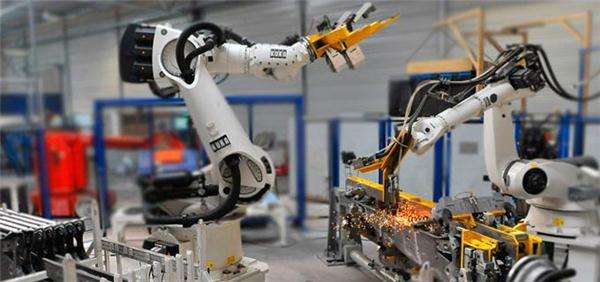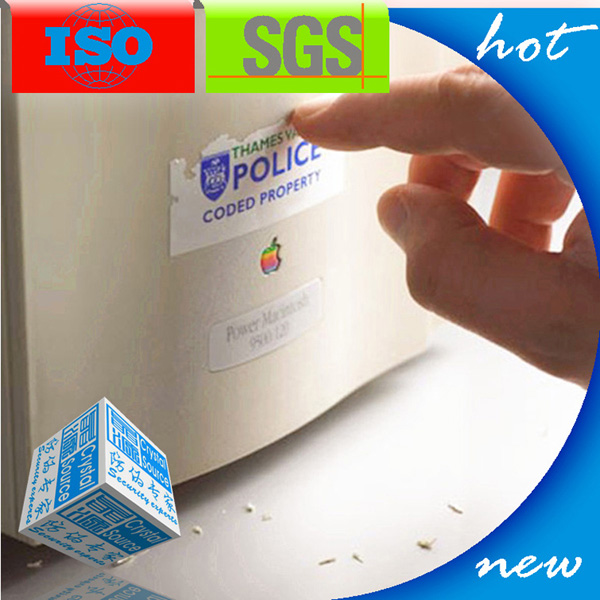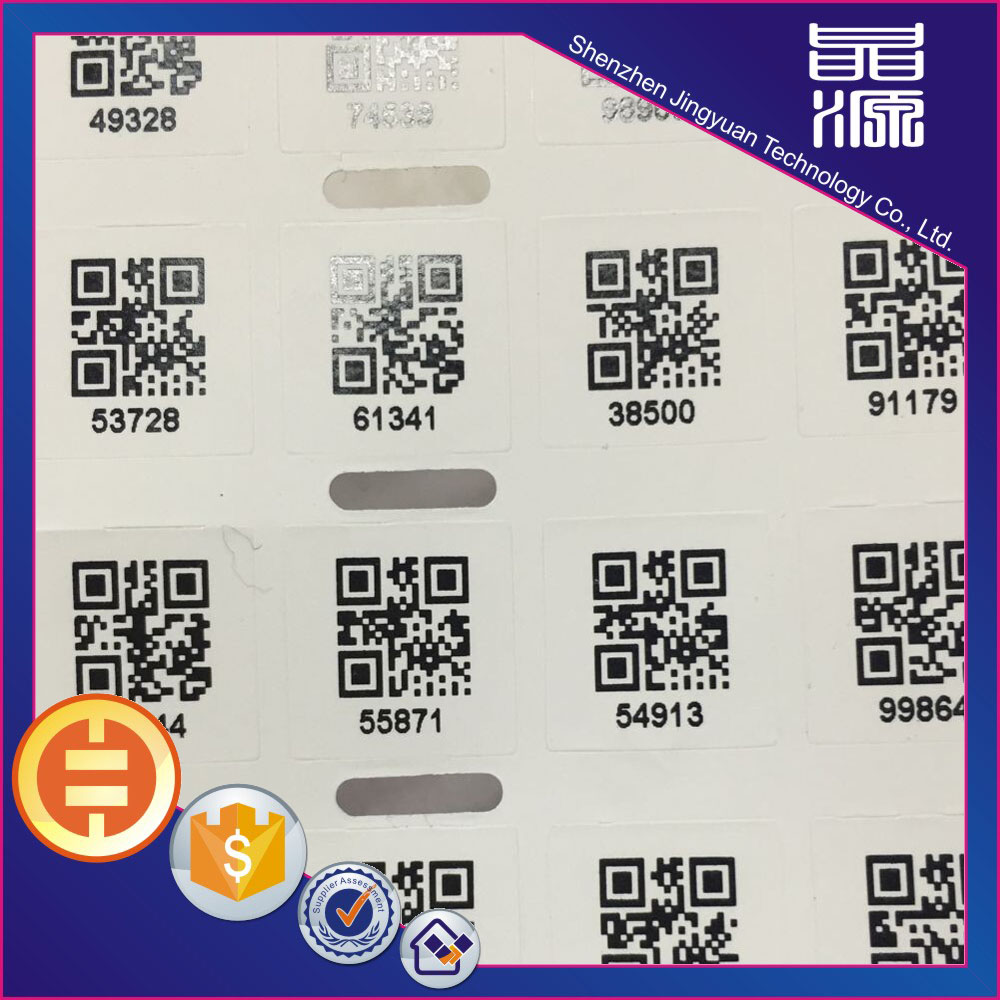A few days ago, the top 20 global auto parts suppliers list was released. According to the latest list released by American Automotive News, Bosch won the championship for eight consecutive years, and Denso jumped to runner-up, and Magna still ranked third. A total of six Chinese companies were listed, namely: Yanfeng, Beijing Hainachuan, CITIC Daika, Johnson Electric, Wuling Industrial and Minth Group, among which Yanfeng ranked 16th. Looking at the top ranked companies, it can be seen that the high-tech of the automotive industry such as electrification, intelligence, and networking has become more and more important in the supplier business, and it also contributes to its performance growth. Eggshell Frangible Paper Seals
Frangible Paper Seals are typically lower cost and are often used on higher volume applications including retail products, medications, confidential documents, etc.
Frangilble paper is very easlier peel off after tear off the label.
The material will destory in order to play a role of anti-fake.
Kindly see below photo for your reference, we can make accept OEM label.
Just need your logo in AI, CDR, EPS file, tks.
Eggshell Frangible Paper Seals,Frangible Paper Seals,Eggshell Paper Seals Shenzhen Tuteng Anti-Counterfeiting Co., Ltd. , https://www.holographicsticers.com
Technology leads the future
"Automobile News" has been publishing the top 100 global auto parts suppliers since 2005, ranking according to the operating income (sales) of the automotive industry supporting market in the previous year. Therefore, the 2018 list of the top 100 is the performance of each supplier in 2017. Among the 100 companies listed on the list, a total of 84 companies achieved year-on-year growth in supporting revenues in 2016, and 16 companies experienced different degrees of decline.
According to statistics, the world's top 10 suppliers in 2017 total vehicle revenue reached 315.44 billion US dollars, an increase of about 8% compared with 2016, although the increase is not particularly large, but it is also considerable. Among the suppliers with revenues exceeding US$40 billion are Bosch and Denso.
The German Bosch Group is firmly on the top of the championship with a score of 47.5 billion US dollars. In fact, in the 14th list that has been released, in addition to being overtaken by Denso in 2010, the champions of other years have always been Bosch, and it is the world's largest supplier of parts and components. Bosch established the Artificial Intelligence Center last year to research artificial intelligence technology and work with Daimler to develop software and algorithms for the autopilot system. The goal is to introduce L4 and L5 full autopilot systems for urban roads by 2020.
At the same time, Bosch integrated the traditional power sector and sold its SG holding company, which is the main starter and generator business, to the Chinese company Zhengmei Machinery. Bosch has also made great progress in the field of electrification, and its 48V light-mixing system can be quickly integrated into new models. “Bosch is accelerating the development of electric mobility. We have received a considerable number of orders in the past year, and some orders have even reached billions of euros,†said Volkmar Dunal, chairman of the Bosch Group’s board of directors. In response to China, the world's largest electric vehicle market, Bosch and Weichai Power are collaborating on a pilot project to jointly develop truck fuel cells. At the Internet of Things conference in February this year, Bosch announced the establishment of a new connected mobile services division, focusing on shared travel and intelligent network services.
Japan Denso is the second company with more than $40 billion in revenues, reaching $40.782 billion. Compared with Bosch, the position of Denso in the list has been ups and downs. For example, Denso ranked fourth in the 2015 list, rose to second in 2016, fell to fourth in 2017, and returned to second in 2018. Against the background of the inevitable trend of electrification in the automotive industry, Toyota, Mazda and Denso signed an agreement on the development of electric vehicle related technologies in September last year and decided to set up a new company for this purpose. The new company is mainly engaged in research and development of basic technology related to electric vehicles covering all levels and models. At the beginning of June this year, Denso and Toyota determined the policy of integrating the electric vehicle parts business. Starting in 2022, Denso will be responsible for mass production of electrified parts for all Toyota vehicles. Denso plans to occupy 30% of the global market share in the field of electrification systems such as transformers and engines by 2025.
Magna is in third place. As the “employee emperor†in the automotive industry, Magna has just joined hands with BAIC New Energy. The two companies plan to establish two joint ventures: engineering development joint ventures and manufacturing joint ventures to provide high-end intelligent pure electric vehicles for the Chinese market. In May of this year, Magna announced that it will invest an additional US$300 million by 2020 to further develop the field of electrification and autonomous driving.
Lear, the 8th-ranked US parts company, has been moving a lot. By acquiring companies such as Israel's GPS developer EXO Technologies, Lear has penetrated further in the field of advanced electronics. As Lear's core business, the car seat market is highly competitive, and Lear hopes to make the seat part of the car's intelligent system, enabling it to predict traffic conditions and provide personalized cabin space for future vehicles.
In addition, in recent years, technological innovations, strategic adjustments, and internal high-level changes have dramatically changed the landscape of suppliers. M&A and splitting have even changed the “identity†and name of several companies. For example, the 11th-ranked Andordo was split from Johnson Controls in October 2016, focusing on the seat business, and established a joint venture with Boeing to form Andorra Aerospace to enter the aircraft seat field. Delphi announced last year that it was split into two companies, Ambrose and Delphi. Among them, Anbofu ranked 21st in the list, focusing on autonomous driving, while focusing on big data, car entertainment information services and car interconnection.
German Japanese leader
In the rankings, the 4th to the 15th are: Continental, ZF, Aisin Seiki, Hyundai Mobis, Lear, Valeo, Faurecia, Andorra, Yazaki, Panasonic car system Sumitomo Electric and Mahler. This shows that German and Japanese parts companies are stronger.
Both Continental and ZF are well-known parts giants. In the high-tech fields such as automatic driving, shared travel, and intelligent network, the mainland group has an early layout and accumulated a lot. Last year, Continental announced that it would invest 300 million euros in electric vehicle technology research and development before 2021. At the 2018 Asia Consumer Electronics Show in mid-June this year, Continental presented a range of electric vehicles and autonomous driving solutions. For example, Continental has developed the "All-ChargeTM Universal Charger" charging system, and electric vehicles equipped with this system can be charged using all types of charging posts.
In order to seize market share and improve its competitiveness as soon as possible, Continental Group has purchased laser radar business from ASC, acquired Argus, a virtual security technology company in Israel, and acquired Quantum in Singapore, and high-tech companies such as Huawei, China Telecom, Baidu and HERE. Cooperate to lay out the autopilot business in advance.
ZF has also invested a lot in the research and development of technologies such as autonomous driving and electric vehicles, and has actively strengthened cooperation with companies such as BAIC, Baidu and Mobileye. At the Frankfurt Motor Show last September, ZF announced a strategic partnership with Baidu to develop autonomous driving solutions for the Chinese market in the areas of autonomous driving, car networking and mobile travel services. Soon after, ZF signed a memorandum of understanding with Beijing Hainachuan to form a joint venture to produce electric vehicle parts for the Chinese market.
As a Japanese parts supplier, Aisin Seiki is in line with Japanese automakers. In March of this year, Toyota, Aisin Seiki and Denso announced a joint investment of 2.8 billion US dollars to form a new joint venture company. In the future, the company is mainly responsible for the production and development of autonomous driving car software. In addition, in April and May of this year, Aisin Seiki suddenly expanded its production capacity in China, and the intention of expansion was undoubtedly caused, causing shocks in the domestic independent transmission industry.
The rise of Chinese companies
In recent years, the number of Chinese companies that have entered the top 100 list has gradually increased. There is only one Chinese company in the 2012 and 2013 list, and two Chinese companies were shortlisted in 2014-2016, and increased to five in 2017. This year, there are six Chinese companies on the list, and these companies are overseas. With business deployment, many companies have greatly enhanced their own strength and overseas visibility through mergers and acquisitions.
Among the six companies on the list, Yan Feng continued to lead with $14.28 billion. As a wholly-owned subsidiary of SAIC Motor, a subsidiary company of SAIC, Yanfeng's overseas business accounts for nearly 30% of its overseas business and is growing rapidly in North America and Europe. The other five Chinese companies are Beijing Hainachuan, CITIC Daika, Dechang Motor, Wuling Industrial and Minth Group.
Among them, Beijing Hainachuan ranked 65th with a revenue of nearly 3.7 billion US dollars. It is a component company under the BAIC Group. The company has established R&D centers in Europe, North America, Asia Pacific, etc. There are 16 factories overseas and customers cover more than 40 vehicle companies. Its products are mainly based on the modular integration of automobiles, and focus on the industrialization of lightweight technologies such as plastic-made steel, lightweight cast aluminum, and high-strength steel thermoforming. In the fields of intelligentization and electrification, etc. Get involved. CITIC Dyka is still ranked 71st, but revenue rose 17.25% year-on-year to US$3.052 billion. CITIC Daika claims to be “the world's largest supplier of aluminum wheels and aluminum chassis partsâ€, mainly for Mercedes-Benz, BMW, Audi, GM, Ford, Toyota, Honda, Hyundai-Kia, FAW, SAIC, Dongfeng, Changan, etc. The vehicle manufacturer supplies the goods.
Johnson Electric rose from 81st to 79th with revenue of $2.336 billion. Johnson Electric is a manufacturer of drive subsystems, including motors, solenoids, switches and flexible connectors. It provides motor and drive products for car companies. In addition to China, it is also available in Switzerland, Germany, France, the United Kingdom, the United States, etc. There is a product development and design center. Wuling Industrial is on the list this year, ranking 80th with US$2.23 billion. At present, Wuling Industrial has large auto parts and vehicle production bases in Liuzhou, Qingdao, Chongqing, Guiyang and Indonesia. Its leading products and production capacity are: 250 sets of chassis, welding and internal and external accessories. 10,000 sets; the annual production capacity of automobile engines is 800,000 units; the annual production capacity of special-purpose vehicles is 100,000 units.
The Minth Group has revenues of $1.75 billion, factories in China, the United States, Thailand, and Mexico, and sales and design centers in Japan and Germany. In addition to the above-mentioned six Chinese companies, the 60th-ranked Nexteer Company has been acquired by Chinese companies, and the 97th German company Preh GmbH also owns 75% of its shares in China Unicom Investment Group. .

